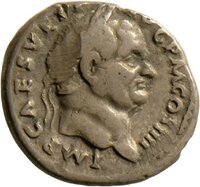
"Vesta (Classical Latin: [ˈwɛsta]) is the virgin goddess of the hearth, home, and family in Roman religion. She was rarely depicted in human form, and was often represented by the fire of her temple in the Forum Romanum. Entry to her temple was permitted only to her priestesses, the Vestals, who tended the sacred fire at the hearth in her temple. As she was considered a guardian of the Roman people, her festival, the Vestalia (7–15 June), was regarded as one of the most important Roman holidays. During the Vestalia matrons walked barefoot through the city to the sanctuary of the goddess, where they presented offerings of food. Such was Vesta's importance to Roman religion that hers was one of the last republican pagan cults still active following the rise of Christianity until it was forcibly disbanded by the Christian emperor Theodosius I in AD 391." - (en.wikipedia.org 10.08.2021)





